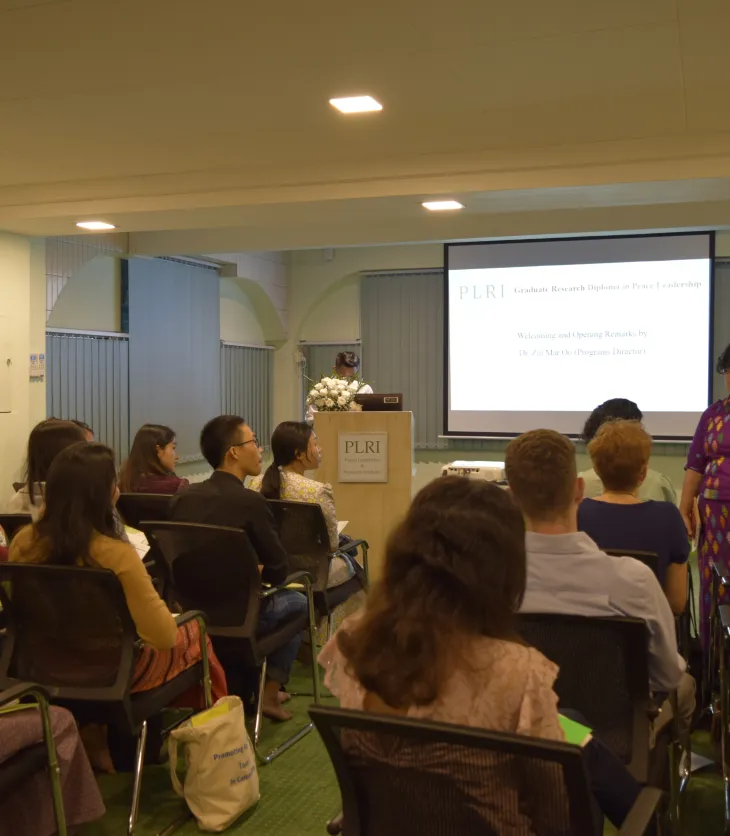Radka Antalikova discusses the newly launched Graduate Research Diploma on peacebuilding and research at the Thabyay Education Foundation.

On Monday 18 June 2018, Thabyay Education Foundation welcomed the very first students to its new Graduate Research Diploma in Peace Leadership program. The year-long program runs under the Peace Leadership and Research Institute, which was established earlier this year. According to the Executive Director of Thabyay Education Foundation, Saw Myo Min Thu, the goal of the program is to enable its students (also called ‘fellows’) to conduct applied quality research on conflict resolution and peacebuilding and, consequently, to make recommendations based on their findings.
The Foundation, operating since 1996 and implementing a range of educational activities with its primary focus on English and community development skills, has by launching this program stepped into a new territory of peace education and academic research. “I believe that peace and education cannot be separated. They have [an] impact on each other. That’s why we envisioned and developed this program,” explained Saw Myo Min Thu.
The 22 fellows attending the program this academic year have been recruited through a rigorous interview process, during which they had to demonstrate adequate academic potential, relevant experience, a strong commitment to peace and development in Myanmar and an interest in research and leadership. As Saw Myo Min Thu noted, young people who were already involved in the peace process and who would benefit from gaining more specialized skills were specifically targeted.
Soe Soe Nwe found out about the program through the Women’s League of Burma, where she, until recently, held a position as a Policy Board member and a Peace Mission Team member. She currently works as a full-time teacher for their Emerging Women Leadership school. Soe Soe Nwe, a native Tavoyan, is primarily interested in women’s participation in the peace process. “I want to learn peacebuilding skills and share those with my colleagues in the Peace Mission Team. Ultimately, I would love to mentor women in peacebuilding.”
Kyaw Zin Linn, of mixed Rakhine, Bamar, and Chinese heritage from Yangon, is a law student and a pro-peace activist. One day, he would like to establish a research-based newsletter documenting the current political situation in the country. “Therefore, I expect to gain proper research methodology skills and sufficient theoretical knowledge about peace and conflict by attending this program.”
Diversity was an essential parameter in recruiting participants of the program. This year’s group gathers 13 women and 9 men of Bamar, Chin, Chinese, Inn Thar, Kachin, Karen, Rakhine, Shan, Tavoyan, and Naga ethnic backgrounds, hailing from Ayeyarwady, Tanintharyi, and Yangon regions, Chin, Kachin, Mon, Rakhine and Shan states as well as Nagaland. The fellows also differ in their religion, language, education and work experience, yet they all have the common goal of leading Myanmar to a peaceful and effective democracy.
Nyan Tun Aung, a Naga freelance researcher, envisions Myanmar as a “stable society with peace, good leadership and governance.” Nyan Tun Aung has been, among others, functioning as the president of the Naga Students and Youth’s Federation-Yangon and previously worked as a researcher at the Enlightened Myanmar Research Foundation. “Good transition process, strong and effective democracy, and no civil wars” is Nang May Thu Aung’s hope for her country. An ethnic Shan from Yangon, Nang May Thu Aung is currently working at the Salween Institute for Public Policy and is primarily interested in learning how to use different research techniques in order to conduct research on conflict issues inside the country, such as education reform.
Most fellows have full-time jobs or attend universities during the day and the program has been planned with this in mind. The program uses a learning approach that combines classroom instruction, online learning, seminars with national and international experts, and a research project. In class, on weeknights and during weekends, as well as via online academic courses, fellows will be acquainted with a variety of tools for conflict analysis and conflict resolution, followed by strategies for peace building. At the same time, fellows will be rigorously trained in research methodology and supervised in conducting their own independent research projects within the field of conflict and peace studies. This way, fellows will be able to apply their theoretical knowledge and research skills in order to come up with strategies and recommendations to tackle contemporary conflicts in Myanmar.
Radka Antalikova, originally from Slovakia, is currently working as Research Instructor/Mentor at the Peace Leadership and Research Institute (PLRI) of Thabyay Education Foundation in Yangon. She received a Master’s degree in Psychology from Comenius University in Bratislava, Slovakia, and a PhD degree in Cross-Cultural Psychology from Aalborg University in Aalborg, Denmark. Prior to joining PLRI, Radka spent two years teaching in one of the refugee camps on the Thailand-Myanmar border.
Like This Article